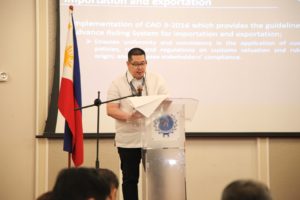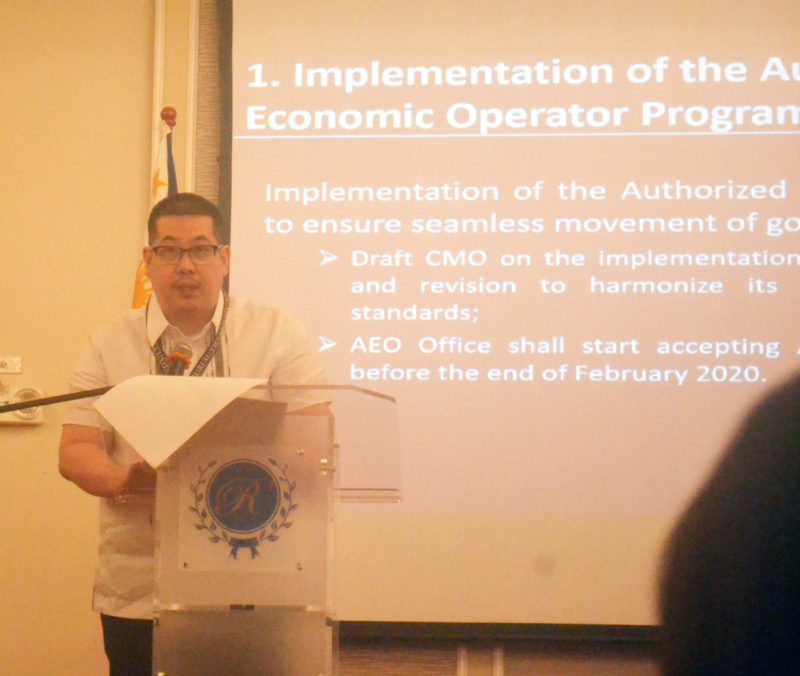
The Bureau of Customs (BOC) has identified nine policies for implementation this year to help facilitate trade and achieve a globally competitive trade environment for businesses in the Philippines.
These are implementing the Authorized Economic Operator (AEO) Program; promoting the advance ruling system; intensifying post-clearance audit; improving the goods classification and valuation support; enhancing pre-arrival processing for air shipments and consignments; introducing voluntary pre-shipment inspection for containerized cargo; improving availment of provisional goods declaration; improving availment of release under tentative; and implementing electronic payment for informal entry.
Part of BOC’s 10 priority programs this year is enhancing trade facilitation to improve pre- and post-importation processes.
BOC assistant commissioner and spokesperson Atty. Vincent Philip Maronilla, in a presentation to stakeholders on February 4, said that after launching its AEO Program in December last year, BOC plans to implement it this year.
The AEO system represents a customs-to-business partnership that seeks to enhance international supply chain security and facilitate movement of legitimate goods. It is being implemented to comply with the country’s commitment to the World Customs Organization’s SAFE Framework of Standards to Secure and Facilitate Global Trade.
The customs memorandum order (CMO) executing the program is currently being reviewed and revised to harmonize its provisions with international AEO standards as recommended by WCO experts during AEO workshops held previously.
Maronilla said the harmonization of CMO provisions is also in preparation for the proposed AEO mutual recognition arrangements with Association of Southeast Asian Nations (ASEAN) member countries.
The office space and online portal facility for the AEO program are also being set up and once these are completed, the AEO office will start accepting AEO candidates and applicants for pre-screening before the end of February 2020.
BOC will also promote the advance ruling system, which provides rulings on the origin and methodology of goods before these are imported and exported.
“The system will ensure certainty and predictability to international trade and help commercial importers or foreign exporters make informed business decision,” Maronilla said.
In addition, BOC will intensify implementation of its post-clearance audit functions through Customs Administrative Order (CAO) No. 1-2019, which not only implements these functions but also the Prior Disclosure Program (PDP).
Specifically, BOC will adopt both transaction audit and account-based audit. He noted that BOC’s Post-Clearance Audit Group (PCAG) is currently only implementing account-based audits, which are based on a three-year importation data, but other customs authorities in modernized countries are enforcing transaction audits.
Maronilla said BOC will issue and implement a CMO on transaction audit, post-clearance audit, and PDP.
The agency also aims to approve the design for the CARMS system, an automated risk management system that PCAG will use to identify and profile candidate firms for post-clearance audit.
PCAG is developing an operations manual concerning policies, guidelines, and procedures relating to profiling.
Moreover, PCAG is proposing a budget for office workstations, equipment and other tools for its operations.
BOC this year aims to improve its goods classification and valuation support by issuing a tariff classification bulletin, “which will be used to correctly identify commodities to a specific tariff heading based on their description.”
In addition, Maronilla said BOC will implement CMO 49-2019, which requires declarants to accomplish completely and properly the supplemental units under Box No. 41 of the goods declaration in the Electronic-to-Mobile (E2M) system.
BOC will continue to implement the National Value Verification System (NVVS), an internal system that BOC formally launched last June. Customs assessment officers may access the system to verify whether the value declared by the importer is the price actually paid or payable for the goods when sold for export to the Philippines.
The customs bureau also aims to enhance its pre-arrival processing of air shipments and consignments by allowing online submission of shipping documents to the Entry Processing Unit (EPU) via email for easier facilitation and advance profiling.
It will allow stakeholders to communicate online with the EPU via email and its Goods Declaration Verification System for shipment status and other concerns.
Another measure set to be activated this year is the voluntary pre-shipment inspection of containerized cargoes.
“With the influx of importation…comes the surge of smuggled goods. For this reason, there is a plan to extend pre-shipment inspection to containerized cargoes to prevent such smuggling of goods,” Maronilla said.
Currently, only bulk and breakbulk shipments are mandated for pre-shipment inspection.
BOC also wants to improve the availment of provisional goods declaration this year. It is already drafting a CMO to provide the interim procedures for availing of provisional goods declaration in accordance with section 403 of the Customs Modernization and Tariff Act (CMTA).
Maronilla said the CMO will establish a clear and firm compliance regime for customs brokers, importers, and other stakeholders.
Another program will focus on improving the availment of release under tentative assessment, which is a method of appeal that the importer can avail of in case of valuation dispute and may use in a protest while on appeal for an assessment dispute.
BOC will also implement the electronic payment for informal entry. With this, Maronilla said the entry of commercial goods under the informal entry will be processed in the E2M system, repealing the current manual procedure. He said this will enhance the capability of BOC to collect and track goods declaration and payment information, as well as assess risk and target high-risk shipments.
The draft CMO on electronic payment is now under review by BOC’s Legal Service.
“With the ever changing role, opportunities, and challenges, the need to redefine global trade practices is indeed a must. It is high time that we look beyond our short-term goals and instead change the direction of our trade system and processes towards a globalized world economy,” Maronilla said.
“Innovations and reforms are needed for us to move forward and achieve a globally competitive trade environment that is conducive to business,” he added. – Roumina Pablo
Photo from BOC





